第三版大学英语精读第一册学生用书Unit1-6 课文理解问题答案
大学英语精读第一册第三版课后翻译答案

1)史密斯太太对我抱怨说,她经常发现与自己十六岁的女儿简直无法沟通。
Mrs. Smith complained to me that she often found it simply impossible to communicate with her 16-year-old daughter.2) 我坚信,阅读简写的 (simplified) 英文小说是扩大我们词汇量的一种轻松I firmly believe that reading simplified English novels is an easy and enjoyable way of enlarging our vocabulary.2)3) 我认为我们在保护环境不受污染 (pollution) 方面还做得不够。
3)I don’t think we’re doing enough to protect our environment from pollution.4)除了每周写作文外,我们的英语老师还给我们布置了八本书在暑假里阅读。
Apart from writing compositions on a weekly basis, our English teacher assigned us eight books to read during the summer vacation.5)我们从可靠的消息来源获悉下学期一位以英语为母语的人将要教我们英语We’ve learned from reliable sources that a native English speaker is going to teach us spoken English next term/semester.6)经常看英语电影不仅会提高你的听力,而且还会帮助你培养说的技能。
Seeing English movies on a regular basis will not only improve your ear, but will also help you build your speaking skills.7)如果你们对这些学习策略有什么问题,请随便问我。
大学英语精读第三版第一册习题答案
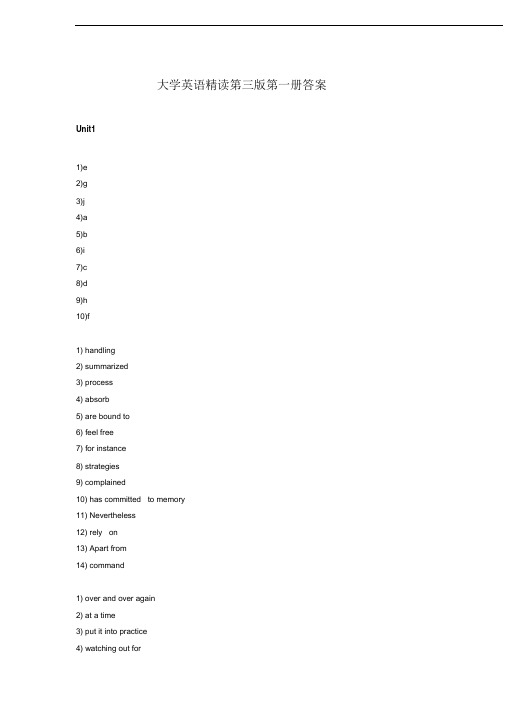
大学英语精读第三版第一册答案Unit11)e2)g3)j4)a5)b6)i7)c8)d9)h10)f1) handling2) summarized3) process4) absorb5) are bound to6) feel free7) for instance8) strategies9) complained10) has committed to memory11) Nevertheless12) rely on13) Apart from14) command1) over and over again2) at a time3) put it into practice4) watching out for5) by no means6) concentrate on7) In addition t8) in detail1)action2)employ3)announce4)examination5)communication6)express7)compose8)improvement9)concentration10)management11)consider12)motivate13)development14)movement15)discuss16)operate17)division18)production19)educate20)repeat1) additional2) add3) addition4) addition1) effectively2) effect3) effective4) effect1) helpful2) help3) helpless4) help5) helplessly6) helpfully7) helpful1) reliant2) reliable3) reliance reliable4) relies5) reliably6)1) repetition2) repeating3) repeatedly4) repeated5) repetition1) In my opinion2) According to Mary3) In our opinion4) According to today's papers5) In most doctors' opinion According to most doctors1) Shakespeare was not only a dramatist but also an actor.2) Miss Crain not only took me home in her car, but also came the next day to see if I had recovered.3) Hainan Island attracts tourists not only in winter but also in summer.4) There is always a black market not only in Britain, but also in other European countries.5) At the Athens Olympics in 2004, Liu Xiang not only won a gold medal in the 110-meter hurdles, but also broke the Olympic record.1) It is true that your sentences are all grammatically correct, but they don ’t make any se2) It is true that they lost that battle, but they still went on fighting.3) It is true that Tom ’s very clever and hardworking, but I still don ’t think he is the right per for the job.4) It is true that learning English is by no means easy, but we can make the task easier by usingsome learning strategies.1) strategies2) frequently3) over and over again4) commit to memory5) acquaintance6) watch out for7) communicate8) process9) opportunities10) rely on11) put into practice12) absorbed1) if2) about3) it4) know5) up6) as7) addition8) even9) into10) other11) for12) while1) memorize2) a matter of3) taught5) realize6) written7) idiomatic8) join in9) difference10) gain a good command翻译1) 史密斯太太对我抱怨说,她经常发现与自己十六岁的女儿简直无法沟通。
新视野大学英语第三版读写教程第一册unit1-unit6课后习题答案
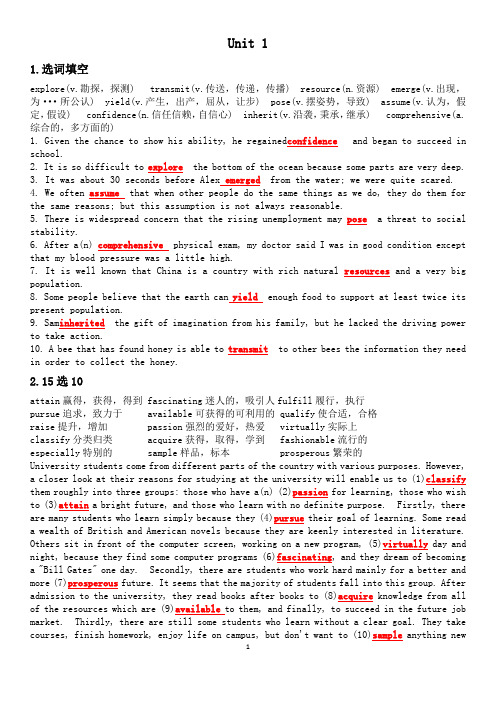
Unit 11.选词填空explore(v.勘探,探测) transmit(v.传送,传递,传播) resource(n.资源) emerge(v.出现,为···所公认) yield(v.产生,出产,屈从,让步) pose(v.摆姿势,导致) assume(v.认为,假定,假设) confidence(n.信任信赖,自信心) inherit(v.沿袭,秉承,继承) comprehensive(a.综合的,多方面的)1. Given the chance to show his ability, he regained confidence and began to succeed in school.2. It is so difficult to explore the bottom of the ocean because some parts are very deep.3. It was about 30 seconds before Alex emerged from the water; we were quite scared.4. We often assume that when other people do the same things as we do, they do them for the same reasons; but this assumption is not always reasonable.5. There is widespread concern that the rising unemployment may pose a threat to social stability.6. After a(n) comprehensive physical exam, my doctor said I was in good condition except that my blood pressure was a little high.7. It is well known that China is a country with rich natural resources and a very big population.8. Some people believe that the earth can yield enough food to support at least twice its present population.9. Sam inherited the gift of imagination from his family, but he lacked the driving power to take action.10. A bee that has found honey is able to transmit to other bees the information they need in order to collect the honey.2.15选10attain赢得,获得,得到 fascinating迷人的,吸引人fulfill履行,执行pursue追求,致力于 available可获得的可利用的 qualify使合适,合格raise提升,增加 passion强烈的爱好,热爱 virtually实际上classify分类归类 acquire获得,取得,学到 fashionable流行的especially特别的 sample样品,标本 prosperous繁荣的University students come from different parts of the country with various purposes. However, a closer look at their reasons for studying at the university will enable us to (1)classify them roughly into three groups: those who have a(n) (2)passion for learning, those who wish to (3)attain a bright future, and those who learn with no definite purpose. Firstly, there are many students who learn simply because they (4)pursue their goal of learning. Some read a wealth of British and American novels because they are keenly interested in literature. Others sit in front of the computer screen, working on a new program, (5)virtually day and night, because they find some computer programs (6)fascinating, and they dream of becoming a "Bill Gates" one day. Secondly, there are students who work hard mainly for a better and more (7)prosperous future. It seems that the majority of students fall into this group. After admission to the university, they read books after books to (8)acquire knowledge from all of the resources which are (9)available to them, and finally, to succeed in the future job market. Thirdly, there are still some students who learn without a clear goal. They take courses, finish homework, enjoy life on campus, but don't want to (10)sample anything newor challenging. They have no idea what they will be doing after college. And they may end up with nothing in their lives.3.选词组open the door to 给···以机会 in advance 预先,提前all at once 同时,一下子 reap the benefits (of) 得享(某事物)的好处make the most of 最大限度的利用某物 over time逐渐地,慢慢地get by过活,活的去 stand a chance (of)有(做成某事)的希望remind ... of 使某人想起 take pleasure in乐于做某事1. My family got by on my father's unemployment benefit after he lost his job.2. Many subway riders read books or listen to music in order to make the most of their time on the way to work.3. In order to make sure he would be able to attend the meeting, I called him up two weeks in advance.4. Experts say our company is amazing in that sales have been increasing steadily over time .5. In order to reap the benefits of the physical exercise, you have to exercise regularly, and for at least half an hour each time.6. They all tried to talk all at once , but I couldn't hear anything they said.7. Yellow flowers in the field always remind me of my childhood in the countryside.8. We have been practicing for so long and so hard that our team should stand a chance of winning the game.9. Research on genes will open the door to exciting new medical treatments.10. Every one of you has made a contribution and I take pleasure in acknowledging what each of you has done to make this academic convention such a success.4.翻译Socrates was a classical Greek philosopher who is credited with laying t he fundamentals (基础) of modern Western philosophy. He is a mysterious figure known chiefly t hrough the accounts of later classical writers, especially the writings of h is most famous student Plato. Socrates has become well known for his contri bution to the field of ethics. His method of teaching, known as the Socrat ic Method, by asking and answering questions to stimulate critical thinking and to explain ideas remains a commonly used tool in a wide range of disc ussions. He also made important and lasting contributions to the field of e pistemology (认识论) and logic, and the influence of his ideas and approach remains a stron g foundation for Western philosophy that followed. Socrates was the most col orful figure in the history of ancient philosophy. His fame was widespreadin his own time, and his name soon became a household word although he co nstructed no philosophical system, established no school, and founded no sect (宗派).苏格拉底是古希腊哲学家,被誉为现代西方哲学的奠基人。
大学英语精读第三版第一册答案
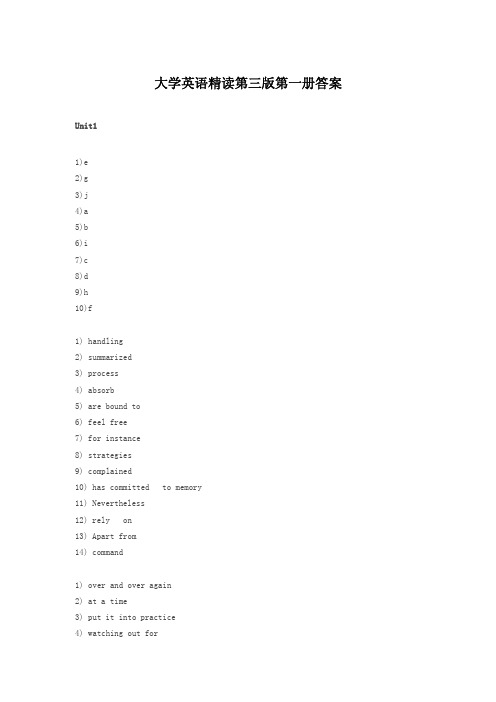
大学英语精读第三版第一册答案Unit11)e2)g3)j4)a5)b6)i7)c8)d9)h10)f1)handling2)summarized3)process4)absorb5)are bound to6)feel free7)for instance8)strategies9)complained10)has committed to memory11)Nevertheless12)rely on13)Apart from14)command1)over and over again2)at a time3)put it into practice4)watching out for5)by no means6)concentrate on7)In addition t8)in detail1)action2)employ3)announce4)examination5)communication6)express7)compose8)improvement9)concentration10)management11)consider12)motivate13)development14)movement15)discuss16)operate17)division18)production19)educate20)repeat1)additional2)add3)addition4)addition1)effectively2)effect3)effective4)effect1)helpful2)help3)helpless4)help5)helplessly6)helpfully7)helpful1)reliant2)reliable3)reliance reliable4)relies5)reliably6)1)repetition2)repeating3)repeatedly4)repeated5)repetition1)In my opinion2)According to Mary3)In our opinion4)According to today's papers5)In most doctors'opinion According to most doctors1)Shakespeare was not only a dramatist but also an actor.2)Miss Crain not only took me home in her car,but also came the next day to see if I had recovered.3)Hainan Island attracts tourists not only in winter but also in summer.4)There is always a black market not only in Britain,but also in other European countries.5)At the Athens Olympics in2004,Liu Xiang not only won a gold medal in the110-meter hurdles,but also broke the Olympic record.1)It is true that your sentences are all grammatically correct,but they don’t make any sense.2)It is true that they lost that battle,but they still went on fighting.3)It is true that Tom’s very clever and hardworking,but I still don’t think he is the right person for the job.4)It is true that learning English is by no means easy,but we can make the task easier by using some learning strategies.1)strategies2)frequently3)over and over again4)commit to memory5)acquaintance6)watch out for7)communicate8)process9)opportunities10)rely on11)put into practice12)absorbed1)if2)about3)it4)know5)up6)as7)addition8)even9)into10)other11)for12)while1)memorize2)a matter of3)taught4)shelf5)realize6)written7)idiomatic8)join in9)difference10)gain a good command翻译1)史密斯太太对我抱怨说,她经常发现与自己十六岁的女儿简直无法沟通。
大学英语精读3 课后翻译题答案1-6单元
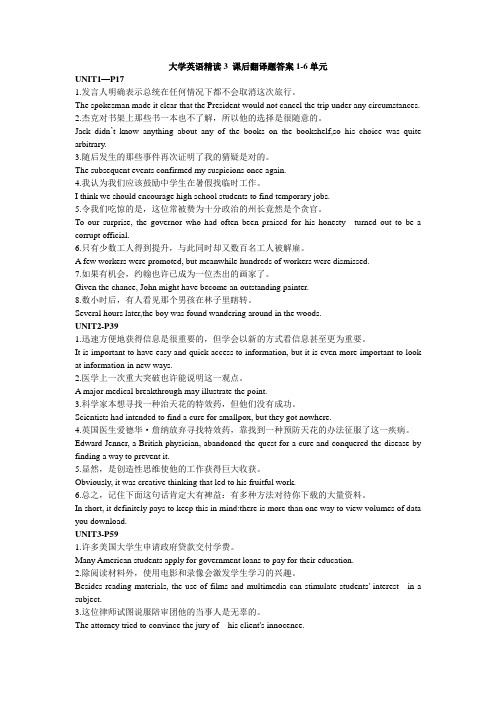
大学英语精读3 课后翻译题答案1-6单元UNIT1—P171.发言人明确表示总统在任何情况下都不会取消这次旅行。
The spokesman made it clear that the President would not cancel the trip under any circumstances.2.杰克对书架上那些书一本也不了解,所以他的选择是很随意的。
Jack didn’t know anything about any of the books on the bookshelf,so his choice was quite arbitrary.3.随后发生的那些事件再次证明了我的猜疑是对的。
The subsequent events confirmed my suspicions once again.4.我认为我们应该鼓励中学生在暑假找临时工作。
I think we should encourage high school students to find temporary jobs.5.令我们吃惊的是,这位常被赞为十分政治的州长竟然是个贪官。
To our surprise, the governor who had often been praised for his honesty turned out to be a corrupt official.6.只有少数工人得到提升,与此同时却又数百名工人被解雇。
A few workers were promoted, but meanwhile hundreds of workers were dismissed.7.如果有机会,约翰也许已成为一位杰出的画家了。
Given the chance, John might have become an outstanding painter.8.数小时后,有人看见那个男孩在林子里瞎转。
大学英语精读一课后答案(完整版)
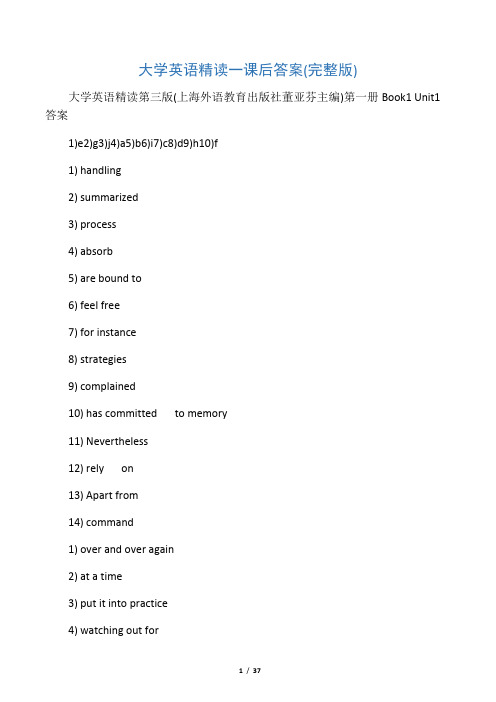
大学英语精读一课后答案(完整版)大学英语精读第三版(上海外语教育出版社董亚芬主编)第一册Book1 Unit1答案1)e2)g3)j4)a5)b6)i7)c8)d9)h10)f1) handling2) summarized3) process4) absorb5) are bound to6) feel free7) for instance8) strategies9) complained10) has committed to memory11) Nevertheless12) rely on13) Apart from14) command1) over and over again2) at a time3) put it into practice4) watching out for5) by no means6) concentrate on7) In addition t8) in detail1)action2)employ3)announce4)examination5)communication6)express7)compose8)improvement9)concentration10)management11)consider12)motivate13)development14)movement15)discuss16)operate17)division18)production19)educate20)repeat1) additional2) add3) addition4) addition1) effectively2) effect3) effective4) effect1) helpful2) help3) helpless4) help5) helplessly6) helpfully7) helpful1) reliant2) reliable3) reliance reliable4) relies5) reliably6)1) repetition2) repeating3) repeatedly4) repeated5) repetition1) In my opinion2) According to Mary3) In our opinion4) According to today's papers5) In most doctors' opinion According to most doctors1) Shakespeare was not only a dramatist but also an actor.2) Miss Crain not only took me home in her car, but also camethe next day to see if I hadrecovered.3)Hainan Island attracts tourists not only in winter but also in summer.4)There is always a black market not only in Britain,but also in other European countries.5)At the Athens Olympics in 2004,Liu Xiang not only won a gold medal in the 110-meter hurdles,but also broke the Olympic record.1)It is true that your sentences are all grammatically correct,but they don’t make any sense.2) It is true that they lost that battle, but they still wenton fighting.3) It is true that Tom’s very clever and hardworking, but Istill don’t think he is the right person forthe job.4) It is true that learning English is by no means easy, butwe can make the task easier by usingsome learning strategies.1) strategies2) frequently3) over and over again4) commit to memory5) acquaintance6) watch out for7) communicate8) process9) opportunities10) rely on11) put into practice12) absorbed1) if2) about3) it4) know5) up6) as7) addition8) even9) into10) other11) for12) while1) memorize2) a matter of3) taught4) shelf5) realize6) written7) idiomatic8) join in9) difference10) gain a good command 翻译1)史密斯太太对我抱怨说,她经常发现与自己十六岁的女儿简直无法沟通。
[讲解]大学英语精读第三版第一册课后习题答案TXT文本
![[讲解]大学英语精读第三版第一册课后习题答案TXT文本](https://img.taocdn.com/s3/m/babaf3db8762caaedd33d495.png)
[讲解]大学英语精读第三版第一册课后习题答案TXT文本大学英语精读第三版第一册课后习题答案TXT文本大学英语精读第三版第一册答案Unit11)e2)g3)j4)a5)b6)i7)c8)d9)h10)f1) handling 2) summarized 3) process 4) absorb5) are bound to 6) feel free 7) for instance 8) strategies 9) complained 10) has committed to memory11) Nevertheless 12) rely on 13) Apart from 14) command1) over and over again2) at a time3) put it into practice4) watching out for 5) by no means 6) concentrate on 7) In addition t 8) in detail1)action2)employ3)announce 4)examination 5)communication 6)express 7)compose8)improvement 9)concentration 10)management 11)consider 12)motivate 13)development 14)movement 15)discuss 16)operate 17)division18)production 19)educate 20)repeat1) additional 2) add3) addition4) addition1) effectively 2) effect 3) effective 4) effect1) helpful 2) help3) helpless 4) help5) helplessly 6) helpfully 7) helpful1) reliant 2) reliable 3) reliance reliable4) relies 5) reliably 6)1) repetition 2) repeating 3) repeatedly 4) repeated 5) repetition1) In my opinion 2) According to Mary3) In our opinion4) According to today's papers5) In most doctors' opinion According to most doctors1) Shakespeare was not only a dramatist but also an actor.2) Miss Crain not only took me home in her car, but also came the next day to see if I had recovered.3) Hainan Island attracts tourists not only in winter but also in summer.4) There is always a black market not only in Britain, but also in other European countries.5) At the Athens Olympics in 2004, Liu Xiang not only won a gold medal in the 110-meter hurdles, but also broke the Olympic record.1) It is true that your sentences are all grammatically correct, but they don’t make any sense.2) It is true that they lost that battle, but they still went on fighting.3) It is true that Tom’s very clever and hardworking, but Istill don’t think he is the right person for the job.4) It is true that learning English is by no means easy, but we can make the task easier by using some learning strategies.1) strategies2) frequently3) over and over again4) commit to memory5) acquaintance6) watch out for 7) communicate 8) process 9) opportunities 10) rely on 11) put into practice12) absorbed1) if2) about3) it4) know5) up6) as7) addition 8) even9) into10) other 11) for12) while1) memorize 2) a matter of 3) taught 4) shelf5) realize 6) written 7) idiomatic 8) join in 9) difference10) gain a good command翻译1) 史密斯太太对我抱怨说,她经常发现与自己十六岁的女儿简直无法沟通。
大学英语精读1Unit1课后答案[整理]
![大学英语精读1Unit1课后答案[整理]](https://img.taocdn.com/s3/m/35cd2bc577eeaeaad1f34693daef5ef7ba0d1216.png)
大学英语精读第三版(上海外语教育出版社董亚芬主编)第一册Book1 Unit1答案III.Vocabulary Activities1. 1)e 2)g 3)j 4)a 5)b 6)I 7)c 8)d 9)h 10)f2. 1) handling2) summarized3) process4) absorb5) are bound to6) feel free7) for instance8) strategies9) complained10) has committed to memory11) Nevertheless12) rely on13) Apart from14) command3. 1) over and over again2) at a time3) put it into practice4) watching out for5) by no means6) concentrate on7) In addition t8) in detailIV.Enriching Y our Word Power2.1) a) additional b) add c) addition d) addition2) a) effectively b) effect c) effective d) effect3) a) helpful b) help c) helpless d) help e) helplessly f) helpfully g) helpful4) a) reliant b) reliable c) reliance reliable d) relies e) reliably5) a) repetition b) repeating c) repeatedly d) repeated e) repetitionV. Usage1) In my opinion2) According to Mary3) In our opinion4) According to today's papers5) In most doctors' opinion / According to most doctorsVI Structure1.1) Shakespeare was not only a dramatist but also an actor.2) Miss Crain not only took me home in her car, but also came the next day to see if I had recovered.3) Hainan Island attracts tourists not only in winter but also in summer.4) There is always a black market not only in Britain, but also in other European countri es.5) At the Athens Olympics in 2004, Liu Xiang not only won a gold medal in the 110-meter hurdles, but also broke the Olympic record.2.1) It is true that your sentences are all grammatically correct, but they don’t make any sense.2) It is true that they lost that battle, but they still went on fighting.3) It is true that Tom’s very clever and hardworking, but I still don’t think he is the right person for the job.4) It is true that learning English is by no means easy, but we can make the task easier by using some learning strategies.VII. Cloze1.1) strategies2) frequently3) over and over again4) commit to memory5) acquaintance6) watch out for7) communicate8) process9) opportunities10) rely on11) put into practice12) absorbed2.1) if2) about3) it4) know5) up6) as7) addition8) even9) into10) other11) for12) whileVIII. Spot Dictation1) memorize2) a matter of3) taught4) shelf5) realize6) written7) idiomatic8) join in9) difference10) gain a good commandIX. T ranslation1) 史密斯太太对我抱怨说,她经常发现与自己十六岁的女儿简直无法沟通。
大学英语精读第三版第一册习题答案
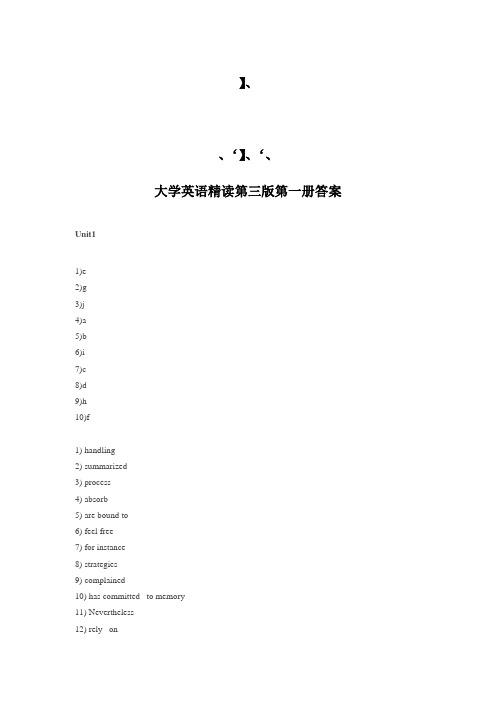
】、、‘】、‘、大学英语精读第三版第一册答案Unit11)e2)g3)j4)a5)b6)i7)c8)d9)h10)f1) handling2) summarized3) process4) absorb5) are bound to6) feel free7) for instance8) strategies9) complained10) has committed to memory11) Nevertheless12) rely on13) Apart from14) command1) over and over again2) at a time3) put it into practice4) watching out for5) by no means6) concentrate on7) In addition t8) in detail1)action2)employ3)announce4)examination5)communication6)express7)compose8)improvement9)concentration10)management11)consider12)motivate13)development14)movement15)discuss16)operate17)division18)production19)educate20)repeat1) additional2) add3) addition4) addition1) effectively2) effect3) effective4) effect1) helpful2) help3) helpless4) help5) helplessly6) helpfully7) helpful1) reliant2) reliable3) reliance reliable4) relies5) reliably6)1) repetition2) repeating3) repeatedly4) repeated5) repetition1) In my opinion2) According to Mary3) In our opinion4) According to today's papers5) In most doctors' opinion According to most doctors1) Shakespeare was not only a dramatist but also an actor.2) Miss Crain not only took me home in her car, but also came the next day to see if I had recovered.3) Hainan Island attracts tourists not only in winter but also in summer.4) There is always a black market not only in Britain, but also in other European countries.5) At the Athens Olympics in 2004, Liu Xiang not only won a gold medal in the 110-meter hurdles, but also broke the Olympic record.1) It is true that your sentences are all grammatically correct, but they don’t make any sense.2) It is true that they lost that battle, but they still went on fighting.3) It is true th at Tom’s very clever and hardworking, but I still don’t think he is the right person for the job.4) It is true that learning English is by no means easy, but we can make the task easier by using some learning strategies.1) strategies2) frequently3) over and over again4) commit to memory5) acquaintance6) watch out for7) communicate8) process9) opportunities10) rely on11) put into practice12) absorbed1) if2) about3) it4) know5) up6) as7) addition8) even9) into10) other11) for12) while1) memorize2) a matter of3) taught4) shelf5) realize6) written7) idiomatic8) join in9) difference10) gain a good command翻译1) 史密斯太太对我抱怨说,她经常发现与自己十六岁的女儿简直无法沟通。
大学英语精读第三版全书答案
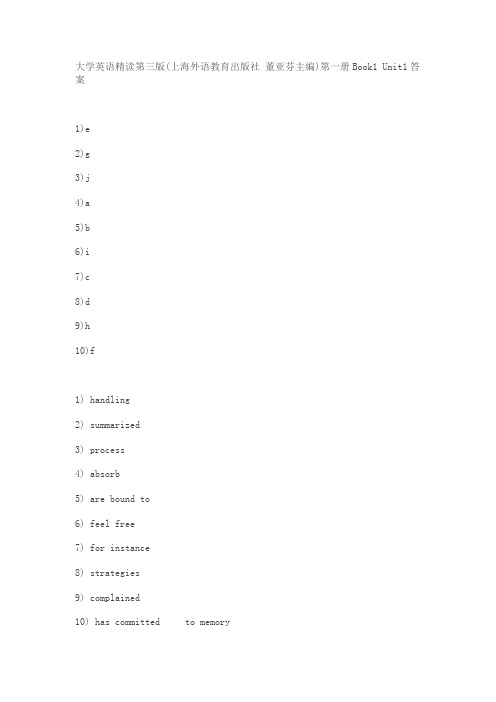
大学英语精读第三版(上海外语教育出版社董亚芬主编)第一册Book1 Unit1答案1)e2)g3)j4)a5)b6)i7)c8)d9)h10)f1) handling2) summarized3) process4) absorb5) are bound to6) feel free7) for instance8) strategies9) complained10) has committed to memory11) Nevertheless12) rely on13) Apart from14) command1) over and over again2) at a time3) put it into practice4) watching out for5) by no means6) concentrate on7) In addition t8) in detail1)action2)employ3)announce4)examination5)communication6)express7)compose8)improvement9)concentration10)management11)consider12)motivate13)development14)movement15)discuss16)operate17)division18)production19)educate20)repeat1) additional2) add3) addition4) addition1) effectively2) effect3) effective4) effect1) helpful2) help3) helpless4) help5) helplessly6) helpfully7) helpful1) reliant2) reliable3) reliance reliable4) relies5) reliably6)1) repetition2) repeating3) repeatedly4) repeated5) repetition1) In my opinion2) According to Mary3) In our opinion4) According to today's papers5) In most doctors' opinion According to most doctors1) Shakespeare was not only a dramatist but also an actor.2) Miss Crain not only took me home in her car, but also came the next day to see if I had recovered.3) Hainan Island attracts tourists not only in winter but also in summer.4) There is always a black market not only in Britain, but also in other European countries.5) At the Athens Olympics in 2004, Liu Xiang not only won a gold medal in the 110-meter hurdles, but also broke the Olympic record.1) It is true that your sentences are all grammatically correct, but they don’t make any sense.2) It is true that they lost that battle, but they still went on fighting.3) I t is true that Tom’s very clever and hardworking, but I still don’t think he is the right person for the job.4) It is true that learning English is by no means easy, but we can make the task easier by using some learning strategies.1) strategies2) frequently3) over and over again4) commit to memory5) acquaintance6) watch out for7) communicate8) process9) opportunities10) rely on11) put into practice12) absorbed1) if2) about3) it4) know5) up6) as7) addition8) even9) into10) other11) for12) while1) memorize2) a matter of3) taught4) shelf5) realize6) written7) idiomatic8) join in9) difference10) gain a good command翻译1) 史密斯太太对我抱怨说,她经常发现与自己十六岁的女儿简直无法沟通。
大学英语精读1答案

大学英语精读第三版第一册Book1 Unit11)e2)g3)j4)a5)b6)i7)c8)d9)h10)f1) handling2) summarized3) process4) absorb5) are bound to6) feel free7) for instance8) strategies9) complained10) has committed to memory11) Nevertheless12) rely on13) Apart from14) command1) over and over again2) at a time3) put it into practice4) watching out for5) by no means6) concentrate on7) In addition t8) in detail1)action2)employ3)announce4)examination5)communication6)express7)compose8)improvement9)concentration10)management11)consider12)motivate13)development14)movement15)discuss16)operate17)division18)production19)educate20)repeat1) additional2) add3) addition4) addition1) effectively2) effect3) effective4) effect1) helpful2) help3) helpless4) help5) helplessly6) helpfully7) helpful1) reliant2) reliable3) reliance reliable4) relies5) reliably6)1) repetition2) repeating3) repeatedly4) repeated5) repetition1) In my opinion2) According to Mary3) In our opinion4) According to today's papers5) In most doctors' opinion According to most doctors1) Shakespeare was not only a dramatist but also an actor.2) Miss Crain not only took me home in her car, but also came the next day to see if I had recovered.3) Hainan Island attracts tourists not only in winter but also in summer.4) There is always a black market not only in Britain, but also in other European countries.5) At the Athens Olympics in 2004, Liu Xiang not only won a gold medal in the 110-meter hurdles, but also broke the Olympic record.1) It is true that your sentences are all grammatically correct, but they don’t make any sense.2) It is true that they lost that battle, but they still went on fighting.3) It is true that Tom’s very clever and hardworking, but I still don’t think he is the right person for the job.4) It is true that learning English is by no means easy, but we can make the task easier by using some learning strategies.1) strategies2) frequently3) over and over again4) commit to memory5) acquaintance6) watch out for7) communicate8) process9) opportunities10) rely on11) put into practice12) absorbed1) if2) about3) it4) know5) up6) as7) addition8) even9) into10) other11) for12) while1) memorize2) a matter of3) taught4) shelf5) realize6) written7) idiomatic8) join in9) difference10) gain a good command翻译1) 史密斯太太对我抱怨说,她经常发现与自己十六岁的女儿简直无法沟通。
大学英语精读第一册答案

7) Hurry up, or you’ll be late.
8) I enjoy classical music. So does she.
9) You may get there either by sea or by air.
10) He must be ill, for he is absent today.
5) are bound to
6) feel free
7) for instance
8) strategies
9) complained
10) has committed to memory
11) Nevertheless
12) rely on
13) Apart from
大学英语精读第三版(上海外语教育出版社 董亚芬主编)第一册Book1 Unit2答案
Mrs. Smith complained to me that she often found it simply impossible to communicate with her 16-year-old daughter.
2) 我坚信,阅读简写的 (simplified) 英文小说是扩大我们词汇量的一种轻松愉快的方法。
11)consider
12)motivate
13)development
14)movement
15)discuss
16)operate
17)division
18)production
19)educate
20)repeat
1) additional
2) add
2) It is true that they lost that battle, but they still went on fighting.
精读第一册答案(1-5单元)

7) 如果你们对这些学习策略有什么问题,请随便问我。我将更详细地进行讲解。
Spot dictation
1) memorize 2) a matter of 3) taught 4) shelf 5) realize 6) written 7) idiomatic 8) join in 9) difference 10) gain a good command
5) At the Athens Olympics in 2004, Liu Xiang not only won a gold medal in the 110-meter hurdles, but also broke the Olympic record.
2. P.14
1) It is true that your sentences are all grammatically correct, but they don’t make any sense.
P.19 Reading Activity及 Guided Writing
1) F 2) F 3) F 4) F 5) F 6) T 7) T 8) T 9) T 10) F
P.20
1)d 2)a 3)c 4)a 5)a 6)d 7)c 8)c
P.21
3) 我认为我们在保护环境不受污染 (pollution) 方面还做得不够。
I don’t think we’re doing enough to protect our environment from pollution.
大学英语精读第一册(第三版)答案教程文件
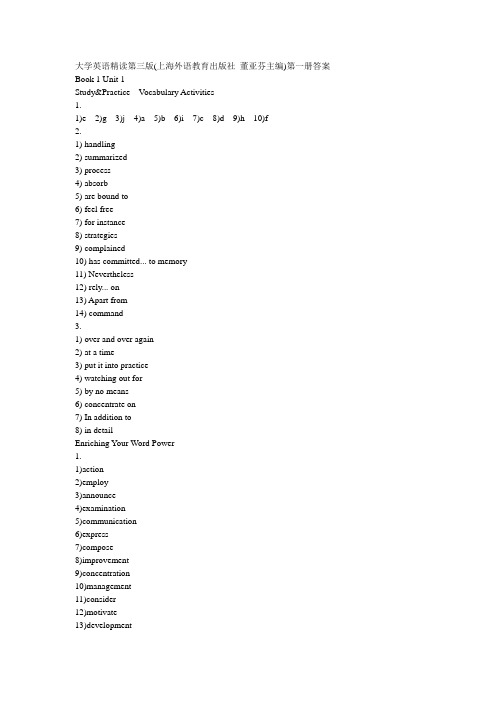
大学英语精读第三版(上海外语教育出版社董亚芬主编)第一册答案Book 1 Unit 1Study&Practice V ocabulary Activities1.1)e 2)g 3)j 4)a 5)b 6)i 7)c 8)d 9)h 10)f2.1) handling2) summarized3) process4) absorb5) are bound to6) feel free7) for instance8) strategies9) complained10) has committed... to memory11) Nevertheless12) rely... on13) Apart from14) command3.1) over and over again2) at a time3) put it into practice4) watching out for5) by no means6) concentrate on7) In addition to8) in detailEnriching Your Word Power1.1)action2)employ3)announce4)examination5)communication6)express7)compose8)improvement9)concentration10)management11)consider12)motivate13)development14)movement15)discuss16)operate17)division18)production19)educate20)repeat2.1) a) additional b) add c) addition d) addition2) a) effectively b) effect c) effective d) effect3) a)helpful b) help c) helpless d) help e) helplessly f) helpfully g) helpful4) a) reliant b) reliable c) reliance, reliable d) relies e) reliably5) a) repetition b) repeating c) repeatedly d) repeated e) repetitionUsage1) In my opinion2) According to Mary3) In our opinion4) According to today’s papers5) In most doctors’ opinion ( According to most doctors)Structure1.1) Shakespeare was not only a dramatist but also an actor.2) Miss Crain not only took me home in her car, but also came the next day to see if I had recovered.3) Hainan Island attracts tourists not only in winter but also in summer.4) There is always a black market not only in Britain, but also in other European countries.5) At the Athens Olympics in 2004, Liu Xiang not only won a gold medal in the 110-meter hurdles, but also broke the Olympic record.2.1) It is true that your sentences are all gramma tically correct, but they don’t make any sense.2) It is true that they lost that battle, but they still went on fighting.3) It is true that Tom’s very clever and hardworking, but I still don’t think he is the right person for the job.4) It is true that learning English is by no means easy, but we can make the task easier by using some learning strategies.Cloze1.1) strategies2) frequently3) over and over again4) commit to memory5) acquaintance6) watch out for7) communicate8) process9) opportunities10) rely on11) put into practice12) absorbed2.1) if2) about3) it4) know5) up6) as7) addition8) even9) into10) other11) for12) whileSpot Dictation1) memorize2) a matter of3) taught4) shelf5) realize6) written7) idiomatic8) join in9) difference10) gain a good commandTranslation1) 史密斯太太对我抱怨说,她经常发现与自己十六岁的女儿简直无法沟通。
大学英语精读第三版第1册课后练习题含答案
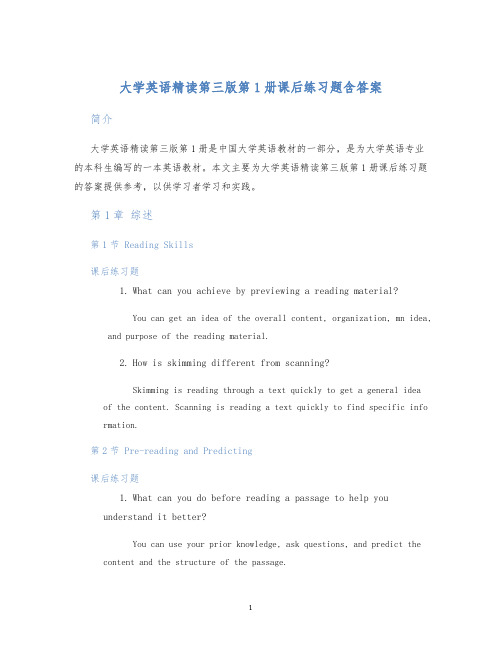
大学英语精读第三版第1册课后练习题含答案简介大学英语精读第三版第1册是中国大学英语教材的一部分,是为大学英语专业的本科生编写的一本英语教材。
本文主要为大学英语精读第三版第1册课后练习题的答案提供参考,以供学习者学习和实践。
第1章综述第1节 Reading Skills课后练习题1.What can you achieve by previewing a reading material?You can get an idea of the overall content, organization, mn idea, and purpose of the reading material.2.How is skimming different from scanning?Skimming is reading through a text quickly to get a general idea of the content. Scanning is reading a text quickly to find specific info rmation.第2节 Pre-reading and Predicting课后练习题1.What can you do before reading a passage to help youunderstand it better?You can use your prior knowledge, ask questions, and predict the content and the structure of the passage.2.What can predictions do?Predictions can motivate you to read carefully and attentively, h elp you understand and retn information more easily, and improve your re ading comprehension.第3节 Identifying the Mn Idea课后练习题1.What is the mn idea of the passage?The mn idea is the most important idea or message that the author wants to convey, and it usually appears in the topic sentence or thesis statement of the passage.2.What are some ways to identify the mn idea of a passage?You can identify the topic, the scope, the purpose, and the suppo rting detls of the passage, and summarize them into a sentence or a phra se that expresses the author's mn idea.第2章阅读与写作第1节 Finding the Topic Sentence课后练习题1.What is a topic sentence?A topic sentence is a sentence that expresses the mn idea or focus of a paragraph, and usually appears at or near the beginning of the pa ragraph.2.How can you find the topic sentence of a paragraph?You can look for signals such as transitional words and phrases, repetition, summary, or explicit statement that introduce, summarize, or highlight the mn topic of the paragraph.第2节 Supporting Detls课后练习题1.What are supporting detls?Supporting detls are specific examples, evidence, facts, reasons, or explanations that support and elaborate on the mn idea or topic of a paragraph.2.What is the difference between a general statement and aspecific example?A general statement is a statement that applies to a broad category or concept, while a specific example is a concrete instance or detl t hat exemplifies or illustrates the general statement.第3节 Writing Effective Paragraphs课后练习题1.What are the three mn parts of a paragraph?The three mn parts of a paragraph are the topic sentence, the sup porting detls, and the concluding sentence.2.What are some guidelines for writing effective paragraphs?Some guidelines for writing effective paragraphs are to organize your ideas logically, use topic sentences and supporting detls, provide transitions, use descriptive language and sensory detls, vary your sentence structure and length, and conclude with a suggestion, a prediction, or a thought-provoking question.结语大学英语精读第三版第1册的课后练习题旨在帮助学习者巩固和深化课堂所学的英语阅读、理解、分析和写作技能。
第三版大学英语精读第一册学生用书Unit1-6 课文理解问题答案

第三版大学英语精读第一册学生用书Unit1-6 课文理解问题答案 Unit 11. What does it take to learn English well?It takes great diligence and prolonged effort.2. How can you make the task of learning English easier?(1) Do not treat all new words in exactly the same way.(2) Watch out for idiomatic ways of saying things.(3) Listen to English every day.(4) Seize opportunities to speak.(5) Read widely.(6) Write regularly.3. What is the most effective route to enlarging your vocabulary?Concentrating on active and useful words.4. What is the second learning strategy suggested by author?Watch out for idiomatic ways of saying things.5. Why is it important to listen to English every day?Listening to English on a regular basis will not only improve your ear,but will also help you build your speaking skills.6. According to the author, what is the easiest way to practice speaking English? And why? To rehearse aloud, since this can be done at any time, in any place, and without a partner.7. Why is it important to read widely?Because in our learning environment, reading is the main and most reliable source of language input.8. What kind of materials should you include in your wide reading?Things that you find interesting, that you can understand without relying too much on a dictionary.9. Apart from your teacher's writing assignment, what other ways of writing does the author suggest?Keeping a pen pal, keeping a diary, writing a short story and summarizing the daily news.10. What is the author's conclusion at the end of the article?It pays to absorb as much as you can from reading and listening and then try to put what you have learned into practice through speaking and writing.Unit 21. What happened to Francis Chichester in 1931?He had tried to fly around the world but failed.2. How old was he when he started his voyage round the world?653. What was the name of his boat? What was the length of the boat?Gipsy Moth ; 16-meter-long.4. What route did Chichester follow in sailing round the world?The route of the great 19th Century clippers ships.感谢您的阅读,祝您生活愉快。
大学英语精读第三版全书答案

大学英语精读第三版(上海外语教育出版社董亚芬主编)第一册Book1 Unit1答案1)e2)g3)j4)a5)b6)i7)c8)d9)h10)f1) handling2) summarized3) process4) absorb5) are bound to6) feel free7) for instance8) strategies9) complained10) has committed to memory11) Nevertheless12) rely on13) Apart from14) command1) over and over again2) at a time3) put it into practice4) watching out for5) by no means6) concentrate on7) In addition t8) in detail1)action2)employ3)announce4)examination5)communication6)express7)compose8)improvement9)concentration10)management11)consider12)motivate13)development14)movement15)discuss16)operate17)division18)production19)educate20)repeat1) additional2) add3) addition4) addition1) effectively2) effect3) effective4) effect1) helpful2) help3) helpless4) help5) helplessly6) helpfully7) helpful1) reliant2) reliable3) reliance reliable4) relies5) reliably6)1) repetition2) repeating3) repeatedly4) repeated5) repetition1) In my opinion2) According to Mary3) In our opinion4) According to today's papers5) In most doctors' opinion According to most doctors1) Shakespeare was not only a dramatist but also an actor.2) Miss Crain not only took me home in her car, but also came the next day to see if I had recovered.3) Hainan Island attracts tourists not only in winter but also in summer.4) There is always a black market not only in Britain, but also in other European countries.5) At the Athens Olympics in 2004, Liu Xiang not only won a gold medal in the 110-meter hurdles, but also broke the Olympic record.1) It is true that your sentences are all grammatically correct, but they don’t make any sense.2) It is true that they lost that battle, but they still went on fighting.3) I t is true that Tom’s very clever and hardworking, but I still don’t think he is the right person for the job.4) It is true that learning English is by no means easy, but we can make the task easier by using some learning strategies.1) strategies2) frequently3) over and over again4) commit to memory5) acquaintance6) watch out for7) communicate8) process9) opportunities10) rely on11) put into practice12) absorbed1) if2) about3) it4) know5) up6) as7) addition8) even9) into10) other11) for12) while1) memorize2) a matter of3) taught4) shelf5) realize6) written7) idiomatic8) join in9) difference10) gain a good command翻译1) 史密斯太太对我抱怨说,她经常发现与自己十六岁的女儿简直无法沟通。
大学英语精读第一册答案
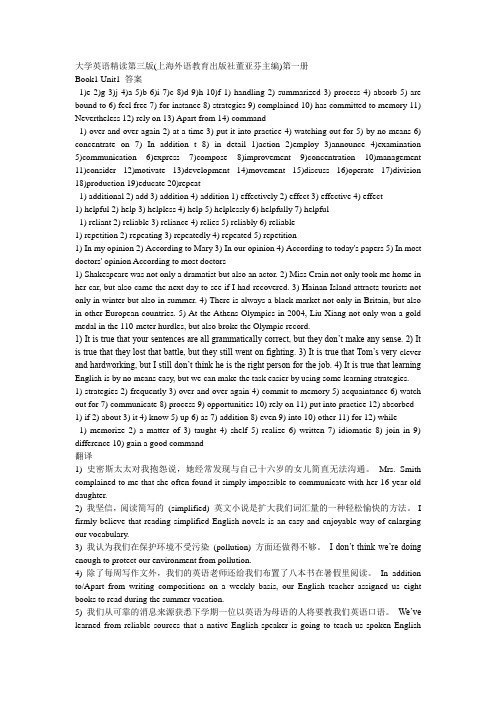
大学英语精读第三版(上海外语教育出版社董亚芬主编)第一册Book1 Unit1 答案1)e 2)g 3)j 4)a 5)b 6)i 7)c 8)d 9)h 10)f 1) handling 2) summarized 3) process 4) absorb 5) are bound to 6) feel free 7) for instance 8) strategies 9) complained 10) has committed to memory 11) Nevertheless 12) rely on 13) Apart from 14) command1) over and over again 2) at a time 3) put it into practice 4) watching out for 5) by no means 6) concentrate on 7) In addition t 8) in detail 1)action 2)employ 3)announce 4)examination 5)communication 6)express 7)compose 8)improvement 9)concentration 10)management 11)consider 12)motivate 13)development 14)movement 15)discuss 16)operate 17)division 18)production 19)educate 20)repeat1) additional 2) add 3) addition 4) addition 1) effectively 2) effect 3) effective 4) effect1) helpful 2) help 3) helpless 4) help 5) helplessly 6) helpfully 7) helpful1) reliant 2) reliable 3) reliance 4) relies 5) reliably 6) reliable1) repetition 2) repeating 3) repeatedly 4) repeated 5) repetition1) In my opinion 2) According to Mary 3) In our opinion 4) According to today's papers 5) In most doctors' opinion According to most doctors1) Shakespeare was not only a dramatist but also an actor. 2) Miss Crain not only took me home in her car, but also came the next day to see if I had recovered. 3) Hainan Island attracts tourists not only in winter but also in summer. 4) There is always a black market not only in Britain, but also in other European countries. 5) At the Athens Olympics in 2004, Liu Xiang not only won a gold medal in the 110-meter hurdles, but also broke the Olympic record.1) It is true that your sentences are all grammatically correct, but they don’t make any sense. 2) It is true that they lost that battle, but they still went on fighting. 3) It is true that Tom’s very clever and hardworking, but I still don’t think he is the right person for the job. 4) It is true that learning English is by no means easy, but we can make the task easier by using some learning strategies. 1) strategies 2) frequently 3) over and over again 4) commit to memory 5) acquaintance 6) watch out for 7) communicate 8) process 9) opportunities 10) rely on 11) put into practice 12) absorbed 1) if 2) about 3) it 4) know 5) up 6) as 7) addition 8) even 9) into 10) other 11) for 12) while1) memorize 2) a matter of 3) taught 4) shelf 5) realize 6) written 7) idiomatic 8) join in 9) difference 10) gain a good command翻译1) 史密斯太太对我抱怨说,她经常发现与自己十六岁的女儿简直无法沟通。
- 1、下载文档前请自行甄别文档内容的完整性,平台不提供额外的编辑、内容补充、找答案等附加服务。
- 2、"仅部分预览"的文档,不可在线预览部分如存在完整性等问题,可反馈申请退款(可完整预览的文档不适用该条件!)。
- 3、如文档侵犯您的权益,请联系客服反馈,我们会尽快为您处理(人工客服工作时间:9:00-18:30)。
Unit 11.What does it take to learn English well?It takes great diligence and prolonged effort.2.How can you make the task of learning English easier?(1) Do not treat all new words in exactly the same way.(2) Watch out for idiomatic ways of saying things.(3) Listen to English every day.(4) Seize opportunities to speak.(5) Read widely.(6) Write regularly.3.What is the most effective route to enlarging your vocabulary?Concentrating on active and useful words.4.What is the second learning strategy suggested by author?Watch out for idiomatic ways of saying things.5.Why is it important to listen to English every day?Listening to English on a regular basis will not only improve your ear,but will also help you build your speaking skills.6.According to the author, what is the easiest way to practice speaking English? And why?To rehearse aloud, since this can be done at any time, in any place, and withouta partner.7.Why is it important to read widely?Because in our learning environment, reading is the main and most reliable source of language input.8.What kind of materials should you include in your wide reading?Things that you find interesting, that you can understand without relying too much on a dictionary.9.Apart from your teacher's writing assignment, what other ways of writing does the author suggest?Keeping a pen pal, keeping a diary, writing a short story and summarizing the daily news.10.What is the author's conclusion at the end of the article?It pays to absorb as much as you can from reading and listening and then try to put what you have learned into practice through speaking and writing.Unit 21.What happened to Francis Chichester in 1931?He had tried to fly around the world but failed.2.How old was he when he started his voyage round the world?653.What was the name of his boat? What was the length of the boat?Gipsy Moth ; 16-meter-long.4.What route did Chichester follow in sailing round the world?The route of the great 19th Century clippers ships.5.How many miles did he cover on the first half of his voyage?14,1006.What did his friends in Sydney try to dissuade him from doing?To start the second past of voyage.7.In what way was the second half of his voyage the more dangerous part?Cape Horn.8.What happened to Chichester on the night of January 30?There was a gale.9.How did Chichester feel after sailing round Cape Horn?He had wakened from a nightmare.10.How was he received when he arrived back in England?A million people were waiting to welcome him , and he was knighted by Queen Elizabeth Ⅱ.11.What title is added to his name when a man become a knight?Sir.12.How many miles did he second half of the voyage cover?14,400Unit 31.What was the special occasion? How old was the old lady?Myra wrote letters to the old lady. 80.2.Did Myra and her husband often come to see the old lady?No. Seldom.3.What had happened to Enid?She died on the operating table.4.Whom did the old lady love more, Myra or Enid? Why?Enid. She is the real one who cares about the old lady.5.Why was the old lady proud of Myra?She succeeded in her work. And won a medal with her husband for their work for the aged.6.The old lady lived alone. But do you think she was very lonely? Why or why not? No, she had Mrs. Morrison and Johnnie to keep company with her.7.Who was Jim? Was he still alive?The old lady's husband. No.8.Who was Johnnie? How old was he? What do you think of him?The little boy lived nearby. Six. He is a lovely ,kind, warm-hearted boy.9.Why did the old lady tear the cheque into pieces?Myra thought money is important than love which hurt the old lady so much. 10.The story tells us that Myra had won a medal for her work with the old people.Do you think she deserved the medal? Do you think she really cared about old people? Why or why not?No. She even didn't care about her mother. She just did these for her benefits.Unit 41.How do many people in the United States spend their free time?Watching TV.2.How does the author feel about the amount of time his countrymen spend watching TV?He thinks they lose their imagination, and they fail to communicate with families and friends.3.What does the author purpose in relation to the television broadcasting in the United States?He purposed that right after the early evening news, all television broadcasting in US be prohibited by law.4.What might the results be if families used a quiet hour to discuss their problems? The family members can know each other better, and to like each other better.5.According to the author, what could help to turn out a more literate new generation?Reading books together.6.What does the author mean by "the story hour"? What effect might it have on the TV networks?Families gather around and listening to mothers or fathers read a good story ; It might force the TV networks to come up with better shows to get us back from our newly discovered activities.7.Sum up the advantages of turning off TV for an hour every night.A more literate generation would be set up ; We might get to know each other better and to like each other better ; Developing our imagination.8.What do you think of the author's proposal?I think the author's proposal is necessary. What we need nowadays is to communicate with our families , TV programs do disturb our generation. So I couldn't agree more with the author.9.Describe the television watching habits of the people around you---when they watch TV, what they watch, how much they watch, and so on.My father likes watching TV after dinner, and he always watch news report; My mother loves watching soap series from19:00 to 22:00 everyday ; I'd like to watch sports when there are matches I am wondering.10.Discuss the advantages and disadvantages of watching TV.略。
